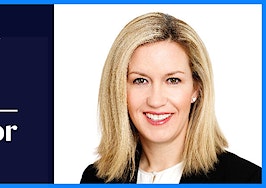This report is available exclusively to subscribers of Inman Intel, a data and research arm of Inman offering deep insights and market intelligence on the business of residential real estate and proptech. Subscribe today.
When the big-name iBuyers like Opendoor, Offerpad, RedfinNow and Zillow Offers first rolled into Phoenix, most established real estate agents saw their presence as a threat to their way of doing business.
But some, like Kenny Klaus of the Keller Williams Integrity First Klaus Team, saw an opportunity to work with the emerging crop of instant-offer companies.
“I was probably one of the first in the Phoenix market to not look at them as the enemy,” Klaus recently told Inman. “But look at them as the consumers are seeing it: they’re a tool in the industry, let’s figure out how to use them as a tool in our business.”
Early on, Klaus’s team adopted a strategy of flat-out telling the homesellers they were working with how much they could fetch if they listed their home on the open market — and how much they could get if they instead chose to sell to an iBuyer. At the time, the offers that companies like Opendoor and Offerpad were writing made listing on the market a hard sell for consumers.

Kenny Klaus
“They were paying a lot for houses. It was tough to not sell to them, quite honestly, if you were the consumer,” Klaus recalled. “It’s a really great deal, and you don’t have to deal with anything else.”
But since then, something has changed. Agents like Klaus who found success working with iBuyers in the past now say they are reconsidering their working relationships with the two remaining iBuyers. And, they say, those companies’ grip on markets they previously dominated has grown ever weaker. Indeed, activity from iBuyers has slowed to such a snail’s pace that agents who specialized in working with the firms are now pivoting, Klaus added, more likely today to talk about getting back to basics than exploring cash offers.
“It’s kind of going back to where we were previous to them even being in the market,” he said, referring to iBuyers. “They’re there but they’re so far on the outside that it’s not impacting or disrupting the business.”
In other markets, where it once seemed like iBuyers would eventually become the be-all end-all of home sales, they have faded into the background at such a rate that they have all but become irrelevant, agents told Inman. And as 20-year high mortgage rates shape the present and future of the industry, one thing has become clear: Real estate’s next chapter is likely to see iBuyers playing a far less prominent role than the one they occupied during the crazed market of 2021 and early 2022.
How we got here
After years of meteoric growth — albeit with a few speed bumps — the steep rise in mortgage rates that played out during the latter half of 2022 changed headwinds for iBuyers, and the housing market at large, dramatically.
Those changing headwinds were well illustrated in the most recent earnings reports. Opendoor — the most dominant remaining iBuyer — lost $400 million in the fourth quarter of 2022 due to burning an average of $28,000 on each home it sold in the fourth quarter.
That’s a stark reversal from the average $16,000 in profit it made for each home it sold in the first three months of 2021.
Opendoor also suffered a net loss of $1.4 billion in 2022, double the $662 million in losses it incurred across 2021, its earnings report shows, mostly due to it being forced to sell homes for less than they purchased them for as the market soured.
When 2022 began, it was supposed to be the year Opendoor charted a path to profitability. Instead, it laid off staff, shut down some of its ancillary services and shook up its executive suite as its business model faced an existential dilemma.
The fourth quarter wasn’t much kinder to Offerpad. The company sold over 10,000 homes during 2022 for the first time in its history, but posted a record loss of $121.1 million during the fourth quarter as revenue declined 22 percent from the year prior to $677.2 million.
That’s after the New York Stock Exchange threatened to remove the company in October after its stock stayed below one dollar per share for 30 consecutive trading days. As of the time of this writing, Offerpad shares were still trading below a dollar and hadn’t cracked that critical threshold in two months.
And of course, Redfin shut down its iBuyer RedfinNow in November, following in Zillow’s footsteps after it shut down its own cash offer program in 2021. Executives at both companies have said they’re glad they made the decision to pull out.
“I probably should have closed the iBuying business earlier,” Redfin CEO Glenn Kelman told the Associated Press in January. “It shouldn’t have taken a housing market correction to realize how capital-intensive and risky that was.”
Zillow CEO Rich Barton meanwhile said during the company’s second quarter 2022 earnings call he was “relieved” the company’s experiment was over.
“Given the macro outlook, I am relieved we are no longer carrying the capital and asset risk of iBuying on our balance sheet,” he said. “The wind down of this business exceeded our expectations in terms of both the speed of home sales on our small remaining inventory and the profit outcomes for these sales.”
Anywhere Real Estate also briefly ran an iBuying operation before shutting it down in January, while Keller Williams has been tight lipped about the future of its small iBuying program Keller Offers.
The comments, the pullouts, the stock market struggles, the massive losses. All of these factors together paint a picture of a sector on the ropes. IBuying always faced questions about viability, but over the past year the concept has plunged into an existential moment.
A new approach
For agents like Klaus in iBuyer hotspots, the impact on the ground has been impossible to miss. IBuyers have become far more careful in their offers, and are more focused on offloading their existing inventory than they are on adding new homes.
“We’re still using them, we’re still getting offers on properties, because they are still making offers,” Klaus said, “they’re just much more conservative.”
Klaus estimated that between 25 and 50 percent of his company’s clients would sell their homes to iBuyers in years past. Currently, none of them do and it has been that way for close to a year.

Russ Cofano
Industry observers were unsurprised by the iBuyers’ newfound caution.
“They’ve got to find a way to manage their cash because it will be very difficult for them to raise more money in the current environment,” Russ Cofano, chief executive officer of the real estate technology firm Collabra Technology, told Inman. “They’ve got to figure out a way to manage their expenses so their burn is lower.”
According to industry analyst Mike DelPrete, buying homes at better terms to them will be essential to Opendoor’s future success.

Mike DelPrete
“They’re buying a lot less houses than they have in the past. Spectacularly fewer houses,” he told Inman. “But the houses that they are buying now, and that they bought in Q4 last year are on much better terms than before that.”
Opendoor has also increased its spread — the amount a home is worth versus what they offer for it — at a disadvantage to sellers, he explained.
“The spread has increased which means it’s not as good a deal to consumers from a financial basis,” he said. “Less consumers are going to choose that option so Opendoor is buying less homes.”
Data from the iBuyer analytics tracker Datadoor shows just how much Opendoor slowed its activity in Phoenix — long one of the most important markets for iBuying — throughout 2022.

Credit: Datadoor and Inman
Opendoor purchased 1,200 homes in Phoenix during the first quarter of 2022 and sold 1,674 at an estimated adjusted gross margin of 8.4 percent, according to Datadoor.
By the fourth quarter, they purchased only 320 homes and sold just 820 — less than half the amount they sold during the first quarter — at a negative gross margin of 11.5 percent.
The first quarter of 2023 has seen activity pick back up slightly on the sell-side, with Datadoor counting 1,071 homes sold but only 200 homes purchased as it offloads inventory.
Datadoor’s numbers show similar declines in activity in other iBuyer hotspots including Atlanta, where purchases fell from 1,526 in the first quarter of 2021 to just 300 in the first quarter of this year.

Credit: Datadoor and Inman
Opendoor has a smaller presence in Houston compared to Atlanta and Phoenix, but there too the company’s activity has followed a parallel trajectory over the last year, Datadoor’s numbers show.

Credit: Datadoor and Inman
While their offers are down significantly, a strategy of more conservative bids could be what eventually puts Opendoor on path to profitability Datadoor co-founder Tyler Okland told Inman.
“What we see in the data is a company changing tactic dramatically,” Okland said. “Steep decline in purchase volume over the past two quarters indicates Opendoor will be selling far fewer homes in the second half of 2023. The new strategy is to bid conservatively, which lowers conversion and therefore offers, but the spread on these homes generates a sturdy buffer for the low-margin business to actually find profitability.”
“All of a sudden, I see them rarely.”
Over the past few years, Tampa Bay Keller Williams agent Natalie Pindar regularly showed clients houses owned by iBuying companies, chiefly Offerpad.
But all of a sudden, during the second half of 2022, the presence of iBuyers in Tampa fell off dramatically, she said.

Natalie Pindar
“We were seeing a lot of their signage, the for-sale posts for Opendoor, Zillow, and I was showing them a lot to buyers over the last couple of years,” Pindar said. “All of a sudden, I see them rarely.”
After years of aggressive expansion and the building of a large stock of homes, suddenly the growth came to a halt right as mortgage rates soared.
“We would see them in our neighborhoods, and they would be there for months and months, and once all of those sold we stopped seeing more pop up,” she said.
The pullback in iBuyer activity has largely been viewed as beneficial to real estate agents, Pindar said.
“I think it’s affecting business for real estate agents because there’s more of it, even though we still have low inventory,” she said. “There are more real estate agents traditionally listing houses.”
Pindar said she’s also seen iBuyers adopt a more collaborative approach to selling their homes in some cases.
“I think they’ve become more helpful to us as real estate agents in the last year or in the last four, five, months with helping our sellers with things that they would normally not do in order to get a home sold,” she said. “They’ll help you remodel the kitchen or something, or do some bathrooms or paint if it’s going to increase the value of your home.”
According to Datadoor, Opendoor’s Tampa operation sold 524 homes during the first quarter of 2022 and purchased 494, with a gross margin of 13.9 percent. During the fourth quarter, their sales nearly halved to 278 and they purchased only 188, while their estimated adjusted gross margin fell to 1.9 percent.

Credit: Datadoor and Inman
Agents in Tampa have adjusted their attitude and now view the remaining iBuyers as less of a threat to their business model, Pindar said.
“I don’t think that they felt they were competing with us as much as we felt we were competing with them,” she noted. “They just want a spot so they’ll take any spot that they can get.”
In Atlanta, the iBuyer pullback has been just as dramatic. Matt Lamarsh, an agent and director of communications for Engel & Völkers Atlanta, estimated that at one point over the last three years iBuyers held 50 percent of the inventory of homes for sale in metro Atlanta.
But things turned around quickly for instant-offer companies as mortgage rates climbed.

Matt Lamarsh
“We saw the numbers quickly and dramatically change in 2022,” Lamarsh told Inman.
Lamarsh has only personally completed one transaction with an iBuyer, when he helped an investor client purchase a home in January 2022. But that one transaction gave him enough of a window into the business model that he said made him question its sustainability even before things took a turn.
Lamarsh’s clients were looking for investment properties in the $250,000-500,000 range and landed on an Opendoor-owned property that the company had purchased for $531,000 in July of 2021 and re-listed less than 45 days later for $561,000. His clients made a winning offer of $535,000, in addition to $7,000 in closing fees, essentially bringing the price down to $528,000.
“Just price to price, that obviously isn’t sustainable,” he said.
Agents working with buyers have similarly seen a sea change in recent months. Among them, Caitlin McKeague — an associate broker at the Desert Dreamers team in Phoenix — the experience has proven frustrating, as consumers become more aware of the challenges faced by the sector but the companies seem determined to stem their losses.

Caitlin McKeague.
“It’s hard to set the right expectations with your buyers,” she told Inman. “Largely, buyers believe that all of these companies are going out of business and they have to offload all of their inventory and they’re going to have to take a steep discount — which then never ends up being the case.”
McKeague says she’s found iBuyers less willing to negotiate down than many of her clients anticipate.
“Most of my clients want to write low offers to these companies because of that reason and because they know they’re not offending anyone,” she said. “They don’t really negotiate that much, or as much as you’d think they would.”
“I expect them to be pretty negotiable, but they hold a pretty hard line,” she added.
In a video posted to TikTok in January, McKeague relayed the story of a client making a lowball offer on a home owned by Opendoor. When Opendoor responded with a counter-offer, it was only $4,000 lower than the original asking price.
@yourphxrealestateagent Do they even want to sell these houses?? Cmon, man! #phoenixrealestate #phoenixaz #homebuyers #offernegotiation #buyingahouse
“Do they even want to sell these houses??” McKeague captioned the video.
A more collaborative approach is one potential path forward iBuyers seem to be exploring as they look to refresh their business model.
A long road ahead
In the face of a changing market and agents who seem to be growing lukewarm on the cash offer concept, the iBuyers have been working lately to pivot. In April, for instance, Opendoor announced it would be expanding its Agent Access program to include buyers agents, and would be adding a referral bonus to the platform. It also announced it would be bumping commissions from 1 percent to 3 percent for an agent’s first three transactions in an effort to woo new agents.
The Agent Access loyalty program has been compared to a punch card at a coffee shop. For each transaction an agent completes with Opendoor, they earn points. If they earn enough points in a year, they can exchange the points for a hefty bonus. On its website, Opendoor framed the news as the company “upping incentives for agents.”
That announcement came after Opendoor embarked on a partnership with its one-time competitor in the iBuyer sphere, Zillow. The two firms first announced their partnership in August 2022, in the form of a new feature on Zillow that allows home sellers in select markets to seamlessly request an Opendoor offer on their home.
The feature has gradually expanded into new markets, including Houston, Phoenix, Dallas, Atlanta and Raleigh.
Opendoor also recently launched a new marketplace, called Exclusives, last fall that is designed to directly connect buyers and sellers. The move provides the company with an asset-light way to stay involved in transactions, even as consumers themselves are the ones buying and selling homes.
“The once-in-a-40-year transition in the housing market last year has resulted in substantially fewer transactions market-wide, off peak highs in early 2022,” Opendoor Head of Partnerships Will Holmes said in a statement to Inman. “As the entire industry continues to navigate this market uncertainty, agents are increasingly adopting Opendoor as part of their business and both agents and their clients are benefiting.”
“Since our founding,” Holmes added, “we’ve paid more than $750 million to agents in commissions and the number of agents representing multiple sellers in Opendoor transactions has increased nearly ninefold in the last four years.”
In a statement to Inman, Offerpad Senior Vice President of Investor Relations Stefanie Layton said agents who use the iBuyer to sell their clients’ homes will reduce the time their listing lingers on the market while adding value to the home by providing light repair services. She also pointed to Offerpad’s agent referral network, which enables agents to draw leads in markets where cash offers are not available.
“Offerpad’s goal is to provide tools that improve the customer homebuying and selling experience, with a full suite of solutions meeting each individual customer’s needs,” Layton said. “Agents can offer their clients the choice of accepting a cash offer, avoiding the hassle of listing their home, and quickly completing the transaction on their schedule while still earning a 3% commission paid by Offerpad.”
Nonetheless, hurdles remain for cash offer companies seeking to shore up relationships with agents. Lamarsh, for instance, said that as the existential threat surrounding Opendoor and Offerpad diminishes, agents have fallen into two camps: those who resisted iBuyers from the beginning who are now thrilled the companies have retreated, and those who partnered with them at one time or another, but found the process difficult and time consuming.
Helping a client buy a home from an iBuyer is an impersonal process that could feel more like dealing with a customer service hotline than purchasing a home from someone, Lamarsh said. Additionally, many of the homes being sold by iBuyers were often in substandard condition for showings.
“When my clients call me I pick up the phone. I respond to their texts, I respond to their emails,” he said. “With [iBuyers] it’s basically like calling into a call center and being put on hold, even as an agent, for five to ten minutes. If you figure that into every transaction, it changes the whole speed of the transaction. It also changes the tone of the conversation.”
At the core of the services real estate agents offer is the promise that those agents will save you time and money. But at least for Lamarsh, the tradeoff from iBuyers doesn’t feel worth it — which has led to their status as a threat diminishing.
“To be honest, I think for what they offered and what they gave to the market, I really feel like the bulk of our agents here feel as though they were all missing something, that their clients were missing something,” he said. “That’s why I think they were not able to attract as much business as they probably hoped.”













